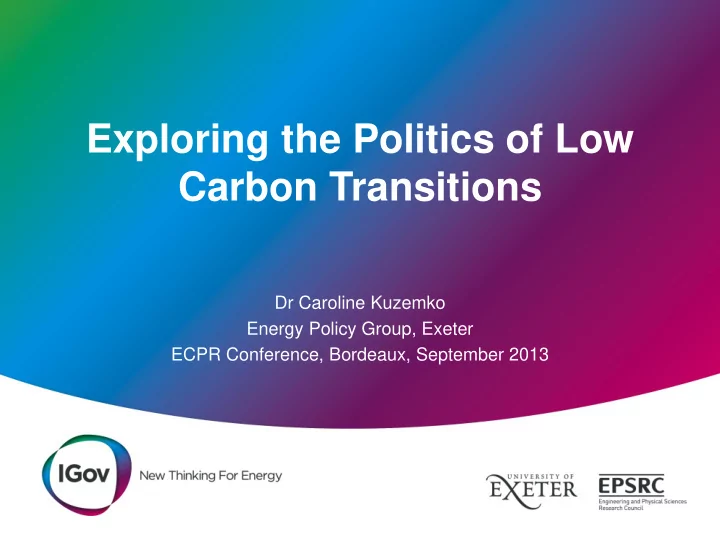

Exploring the Politics of Low Carbon Transitions Dr Caroline Kuzemko Energy Policy Group, Exeter ECPR Conference, Bordeaux, September 2013
Background • Living through series of crises and challenges to existing (pro-market) institutions: focus on climate change • Transition to a low carbon energy system understood as a large part of the solution but limited progress • Two primary assumptions: – Energy systems are both social and technical in nature – Energy policy important to the redesign of energy systems • This paper seeks a better understanding of low carbon energy transition and the role of policy within it • Understands transition policies as contingent upon other political institutions and structures 1
Beyond Single Theoretical Paradigms Socio-technical Transitions (STT) New Institutionalism (sociological) Technical systems (i.e. fossil fuel) as Provides explanations of how political fulfilling important social needs institutions operate and change Technologies and infrastructures: social Political institutions informed, among constructs within certain contexts other things, by frameworks of ideas including about the policy area Inter-related areas: infrastructures, Policy as constructed of various levels: technology, the environment, user objectives and instruments practices, corporates, institutions, politics Transitions as large-scale transformation Profound change can be incremental in which structure fundamentally changes and/or punctuated by major structural shifts – explains how and why of change 2
STT on Low Carbon Transition • Systems have three levels: landscape, regime and niche • Regimes as mainstream ways of realising social functions: rule sets blind actors to new developments • Innovations take place at niche level - breakthrough to regime when changes in the landscape level destabilise regimes (i.e. new knowledge about climate change) • Low carbon energy transition as unprecedented : – Major energy transitions took 150 years (time limited now) – Low carbon energy benefits less tangible than previous new services (different drivers) – Niche innovations need support (innovation chains) • Policy as vital to transition: supporter, enabler, manager, director – institutions as cites for learning 3
Where is the Politics of Energy? • Presents visions of a low carbon energy future as accepted and as relatively uncontested whereas post decades of climate change moving up political agendas fossil fuels remain the dominant technical system • Little consideration of how existing political (and other) institutions will give way and/or change • Needs more articulation of why policy should change – i.e. ways in which existing energy regimes are failing • Low carbon energy policies often proscribed without considering how they relate to wider political contexts 4
Transition within Broader Paradigms • Energy transition policies are informed by a range of other institutions and ideas – often subject to general rules of economic management • i.e. Pro- market paradigm and the ‘compromise of liberal environmentalism’ (post 1980s): – Energy transition as an objective but often reliant upon market solutions/ instruments to deliver – The private sector is now largely responsible for the delivery of energy services and investing in new energy – In some countries energy companies are also responsible for delivering climate policies – Rules and norms have so far tended to favour established companies and non-disruptive technologies (fossil fuels) 5
Transition Policy within Energy Policy • Energy policy has historically emphasised energy’s public good characteristics: – As engine of growth; merit good; input to GDP • Energy policy has as such been set towards achieving other objectives : security and social development • Energy has been singled out for specific treatment: – Russian energy re-nationalisation not extended to other sectors; subsidisation of energy in developing countries; EU political support for pipeline infrastructure • Even within market liberal economies certain goods and services have received support from state bodies (Crouch) and state actors have worked to create markets (Mazzucato) – in the national or collective interest 6
Competing Narratives of Change • Alternative ideas can underpin change by highlighting crisis, proving policy failure, and providing solutions • New knowledge about climate change has indeed challenged existing market institutions but there are other drivers for change: – Growing fears about energy security (2000s) – in some countries this trumps climate objectives – Social equity: alleviation of energy poverty • Climate objectives are constantly being balanced with other forces influencing energy policy change in ways that compromise and constrain transition • i.e. security narrative prefers stability whilst climate framing supports the development of new technologies 7
Conclusions • Policy is vital to transition, not least to support new innovations, but the reality of the politics of transition is murky, complex and divided • Understand complexity by exploring ways in which energy policy for transition is contingent upon other political institutions • Change is happening but it draws on different policy paradigms with under-explored internal tensions • Importance of maintaining the link between politics and technologies and infrastructures – change in one area is not enough 8
Recommend
More recommend